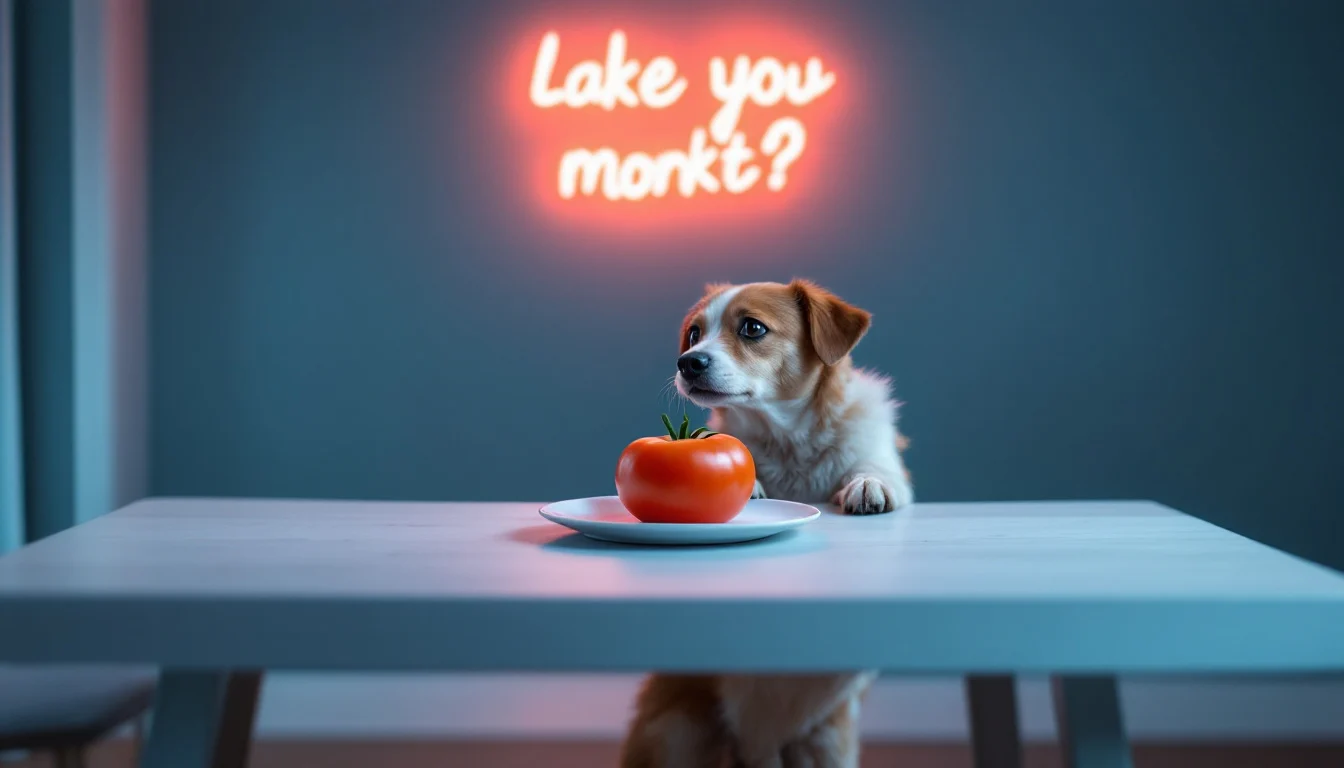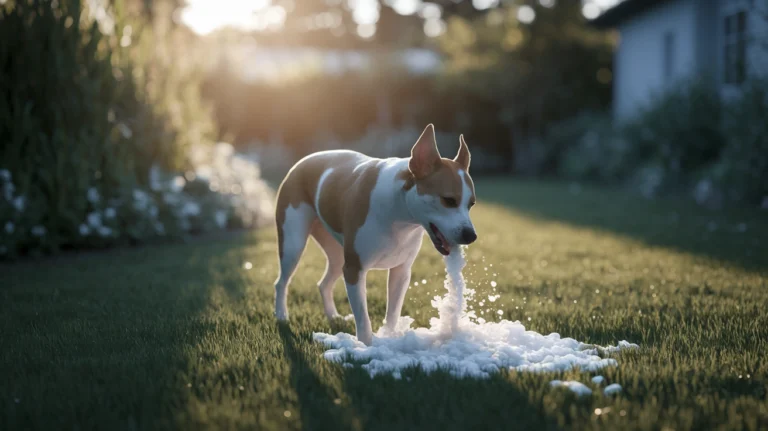Can dogs have tomatoes? Discover the 5 crucial facts about feeding tomatoes to dogs, potential risks, safe preparation methods, and vet-approved guidelines.
As dog owners, we often wonder which human foods are safe to share with our furry companions. Tomatoes are a common ingredient in many households, making their way into salads, sandwiches, and countless recipes. But can dogs have tomatoes? This comprehensive guide will address everything you need to know about dogs and tomatoes, from potential benefits to hidden dangers. Whether you’re a seasoned pet parent or a first-time dog owner, understanding what foods are safe for your canine friend is essential for their health and well-being.
Table of Contents
Can Dogs Eat Tomatoes Safely?
The answer to can dogs have tomatoes isn’t a simple yes or no. Ripe tomatoes, in small quantities, are generally safe for dogs to consume. The red, mature fruit of the tomato plant contains beneficial nutrients that, when given in moderation, can be a healthy addition to your dog’s diet.
However, not all parts of the tomato plant are safe, and not all dogs should eat tomatoes. The green parts of the plant — including stems, leaves, and unripe tomatoes — contain solanine and tomatine, compounds that are toxic to dogs when consumed in large quantities.
According to a 2023 study by the American Veterinary Medical Association, approximately 7% of all plant-related toxicity cases in dogs involve the consumption of nightshade plants, which include tomatoes. This statistic underscores the importance of understanding exactly how tomatoes can affect your canine companion.
The Nutritional Profile of Tomatoes
Before delving deeper into whether dogs can have tomatoes, let’s examine what these fruits contain:
| Nutrient | Amount per 100g | Benefit for Dogs |
| Water | 94.5g | Hydration |
| Protein | 0,9g | Muscle maintenance |
| Fiber | 1.2g | Digestive health |
| Vitamin C | 14mg | Immune support |
| Vitamin K | 7.9μg | Blood clotting |
| Potassium | 237mg | Heart and muscle function |
| Lycopene | 2.5-3mg | Antioxidant properties |
omatoes are low in calories and high in water content, making them a potentially refreshing treat for dogs, especially during warmer months. They contain several vitamins and minerals that can contribute positively to canine health.
Potential Health Benefits of Tomatoes for Dogs
When wondering “can dogs have tomatoes,” it’s worth considering the potential benefits these fruits can offer:
1. Antioxidant Properties
Tomatoes are rich in lycopene, an antioxidant that gives them their red color. Lycopene helps combat free radicals in the body, which can contribute to cellular damage and aging. Studies suggest that lycopene may help reduce the risk of certain types of cancer and heart disease in dogs, much as it does in humans.
2. Hydration Support
With a water content of over 94%, tomatoes can help contribute to your dog’s daily hydration needs, especially important for active dogs or during hot weather.
3. Digestive Health
The fiber in tomatoes can support healthy digestion in dogs. Regular, moderate consumption may help prevent constipation and promote gut health.
4. Immune System Boost
The vitamin C content in tomatoes can help support your dog’s immune system, although it’s worth noting that unlike humans, most dogs can produce vitamin C naturally in their liver.
5. Heart Health
Tomatoes contain potassium, which is essential for proper heart function and muscle contractions in dogs.
While these benefits are real, it’s important to remember that dogs should get most of their nutrition from high-quality dog food. Tomatoes should only be an occasional supplement to a balanced diet.
Risks and Dangers: When Tomatoes Become Toxic
Understanding when and why tomatoes might be dangerous is crucial when asking “can dogs have tomatoes“:
The Nightshade Factor
Tomatoes belong to the nightshade family (Solanaceae), which includes potatoes, eggplants, and peppers. Plants in this family contain solanine and tomatine, glycoalkaloid compounds that act as natural pesticides.
Green Parts Are Toxic
The highest concentration of these toxic compounds is found in:
- Green, unripe tomatoes
- Stems and leaves
- Tomato plant vines
- Flowers
A 2022 veterinary toxicology report indicated that a medium-sized dog would need to consume approximately 3-5 green tomatoes or a substantial amount of stems and leaves to experience serious toxic effects. However, sensitivity can vary among individual dogs.
Processing and Preparation Concerns
When considering if dogs can have tomatoes, the preparation method matters:
- Canned tomatoes often contain added salt, which can be harmful to dogs
- Tomato sauce may include onions, garlic, and other ingredients toxic to dogs
- Tomato soup typically contains dairy, onions, and high sodium levels
- Sun-dried tomatoes might be preserved with ingredients unsuitable for canine consumption
The 5 Critical Things You Must Know
When it comes to feeding tomatoes to your dog, here are the five essential facts every pet owner should understand:
1. Ripeness Is Key
Only ripe, red tomatoes are safe for dogs. The ripening process significantly reduces the concentration of tomatine and solanine. A fully red tomato contains minimal amounts of these compounds, making it generally safe for canine consumption in moderation.
2. Portion Control Matters
Even when feeding ripe tomatoes, moderation is crucial. Veterinary nutritionists recommend that treats, including fruits like tomatoes, should constitute no more than 10% of your dog’s daily caloric intake. For most dogs, this means no more than a few small pieces of tomato occasionally.
3. Individual Sensitivity Varies
Just like humans, dogs can have food sensitivities or allergies. Some dogs may react negatively to tomatoes even if they’re ripe and given in small quantities. Watch for signs of digestive upset, such as vomiting or diarrhea, after introducing tomatoes for the first time.
4. Preparation Should Be Simple
If you decide to share tomatoes with your dog:
- Remove all stems, leaves, and vines
- Choose fully ripe, red tomatoes
- Wash thoroughly to remove pesticides
- Cut into small, manageable pieces
- Serve plain without salt, spices, or other additives
5. Commercial Tomato Products Are Usually Unsafe
When pondering “can dogs have tomatoes” in processed form, the answer is generally no. Tomato sauce, ketchup, soup, and other tomato-based products often contain:
- Onions and garlic (toxic to dogs)
- High sodium levels
- Sugar or artificial sweeteners
- Preservatives and additives
According to the Pet Poison Helpline, cases involving tomato sauce ingestion are more common than those involving fresh tomatoes, with a 43% increase in calls related to commercial tomato product consumption by dogs between 2019 and 2023.
How to Safely Introduce Tomatoes to Your Dog’s Diet
If you’ve determined that your dog can safely have tomatoes, here’s how to introduce them properly:
Start Small
Begin with a tiny piece of ripe tomato and observe your dog for 24-48 hours for any adverse reactions, including:
- Gastrointestinal upset
- Changes in stool consistency
- Allergic reactions (itching, hives, swelling)
- Behavioral changes
Preparation Methods
Safe ways to serve tomatoes to dogs include:
- Fresh slices: Small pieces of washed, ripe tomato with seeds removed
- Mixed with regular food: Diced tomato mixed into their usual meal
- Frozen chunks: Small pieces of tomato frozen for a refreshing summer treat
Frequency Guidelines
Even for dogs that tolerate tomatoes well, these fruits should be an occasional treat rather than a daily addition to their diet. Most veterinary nutritionists recommend offering tomatoes no more than once or twice a week.
Signs of Tomato Poisoning in Dogs
Despite taking precautions, accidents can happen. If your dog consumes green tomatoes or tomato plant parts, be vigilant for these symptoms of tomato poisoning:
Immediate Symptoms
- Gastrointestinal distress (vomiting, diarrhea)
- Excessive drooling
- Lethargy
- Loss of appetite
- Confusion or disorientation
Severe Poisoning Signs
- Cardiac effects (abnormal heart rate)
- Dilated pupils
- Tremors or seizures
- Difficulty breathing
- Loss of coordination
The severity of symptoms typically depends on the amount consumed and the size of your dog. Smaller breeds may show symptoms after consuming smaller amounts compared to larger dogs.
When to Contact a Veterinarian
If you know your dog has consumed tomato plant parts or green tomatoes, or if they’re showing any symptoms of poisoning, don’t wait for the condition to worsen. Contact your veterinarian or an emergency animal hospital immediately. The ASPCA Animal Poison Control Center (888-426-4435) can also provide guidance in tomato poisoning situations.
Safe Tomato Alternatives for Dogs
If you’re hesitant about feeding your dog tomatoes or your pet has shown sensitivity to them, consider these safer red fruit alternatives:
1. Strawberries
Rich in vitamin C, fiber, and antioxidants, strawberries make an excellent treat for dogs. They’re naturally sweet and most dogs enjoy their taste and texture.
2. Watermelon (Seedless)
With its high water content, seedless watermelon provides hydration along with vitamins A, B6, and C. Just be sure to remove all seeds and rind before serving.
3. Red Bell Peppers
Though also in the nightshade family, red bell peppers contain less solanine than tomatoes and are packed with vitamins A, E, B6, and C.
4. Apples (Red Varieties)
Red apples provide fiber, vitamins A and C, and help clean your dog’s teeth naturally. Always remove the seeds and core before serving.
These alternatives can provide similar nutritional benefits without the risks associated with tomatoes.
Recommended Pet Products
For pet owners concerned about nutrition and safety, these products can help support your dog’s health:
Amazon Pet Product Recommendations
- Hill’s Science Diet Sensitive Stomach & Skin Dog Food – Premium dog food formulated for pets with food sensitivities
- Zesty Paws Allergy Immune Supplement for Dogs – Supports immune system health for dogs with food sensitivities or allergies
- PetSafe Busy Buddy Twist ‘n Treat Dispensing Dog Toy – Helps slow feeding and provides mental stimulation
- Doggie Dailies Probiotics for Dogs – Supports digestive health and may help dogs better tolerate various foods
Frequently Asked Questions
Can puppies eat tomatoes?
No, puppies should not eat tomatoes. Puppies have more sensitive digestive systems than adult dogs and are smaller in size, making them more vulnerable to the toxic compounds in tomatoes. Wait until your dog is fully grown before introducing tomatoes or other human foods.
Is tomato sauce safe for dogs?
No, tomato sauce is not safe for dogs. Commercial tomato sauces typically contain onions, garlic, salt, and other seasonings that can be harmful to dogs. Even homemade tomato sauce without these ingredients is often highly acidic and concentrated, potentially causing digestive upset.
Can dogs eat cherry tomatoes?
Yes, dogs can eat ripe cherry tomatoes in moderation. The same rules apply as with regular tomatoes – they must be fully ripe, and the green parts must be completely removed. Due to their small size, cherry tomatoes should be cut in half to prevent choking, especially for smaller breeds.
Will one green tomato hurt my dog?
The toxicity of green tomatoes depends on the size of your dog and the amount consumed. For small dogs, even one green tomato might cause mild symptoms of poisoning. For larger dogs, one small green tomato might cause only mild digestive upset. However, it’s best to prevent any consumption of green tomatoes and seek veterinary advice if ingestion occurs.
Are there dogs that shouldn’t eat tomatoes at all?
Yes, certain dogs should avoid tomatoes completely:
- Dogs with acid reflux or sensitive stomachs
- Dogs with tomato allergies
- Dogs with certain medical conditions like kidney disease
- Dogs on medications that might interact with compounds in tomatoes
Always consult with your veterinarian before introducing any new food to dogs with pre-existing health conditions.
Can dogs have tomatoes if they’re cooked?
Yes, dogs can have cooked tomatoes if they’re fully ripe before cooking and prepared without harmful additives. Cooking actually increases the bioavailability of lycopene in tomatoes. However, never feed your dog tomatoes cooked with onions, garlic, excessive salt, or other seasonings harmful to canines.
How much tomato can I give my dog?
The appropriate amount depends on your dog’s size, but a general guideline is:
- Small dogs (under 20 lbs): 1-2 small pieces occasionally
- Medium dogs (20-50 lbs): Up to half a small tomato occasionally
- Large dogs (over 50 lbs): Up to one small tomato occasionally
These portions should be considered maximum amounts and offered no more than once or twice a week.
Can dogs eat tomato soup?
No, dogs should not eat tomato soup. Commercial tomato soups typically contain onions, dairy, salt, and other ingredients that can be harmful to dogs. The concentrated tomato content can also cause stomach upset due to high acidity.
Call-to-Action
Want to learn more about safe and healthy foods for your four-legged friend? Visit BlithePet for expert recommendations and comprehensive guides on pet nutrition, health, and care. Our team of veterinary experts and animal nutritionists regularly updates our content with the latest research and findings to help you make informed decisions about your pet’s diet and well-being.
Conclusion
So, can dogs have tomatoes? The answer is yes, but with important caveats. Ripe, red tomatoes in small quantities can be a safe, occasional treat for most healthy adult dogs. However, green parts of the tomato plant contain compounds toxic to dogs and should always be avoided.
When it comes to your dog’s diet, safety should always be your priority. If you’re unsure whether tomatoes or any other human food is appropriate for your specific dog, consult with your veterinarian. They can provide guidance based on your pet’s individual health needs, age, size, and any existing medical conditions.
Remember that treats like tomatoes should make up no more than 10% of your dog’s daily caloric intake, with the majority of their nutrition coming from high-quality, complete dog food formulated for their specific needs.
Share your experience with feeding tomatoes or other fruits to your dog in the comments below! Have questions about other foods and their safety for your canine companion? Let us know, and our experts will address your concerns in future articles.







